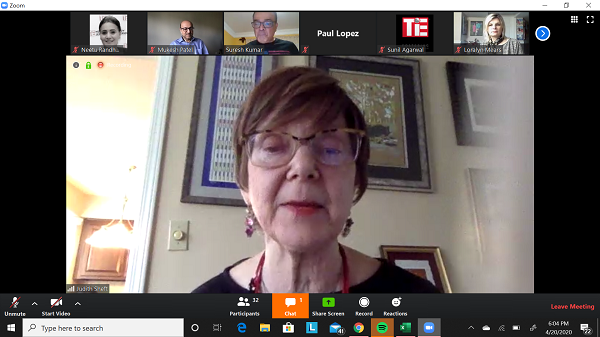Student Founders in Lockdown Get Advice from Expert Panelists at TiE NJ Virtual Forum
The TiE University program in New Jersey hosted its first-ever virtual event for student entrepreneurs on April 20.
Moderated by Suresh Kumar, NJIT professor and chair of the nonprofit organization TiE New Jersey (Edison), the event, titled “Surviving the Lockdown: Tips for Student Founders,” informed university students about ideas, best practices and resources they can use to help their startups survive during the Covid-19 economic downturn. The advice came from a team of experts with deep roots in university startup ecosystems.
There was a clear need for this event, Kumar said. “I have not come across a single event that is focused on student founders — which is the reason why TiE New Jersey decided that we should” have one for them.
Paul Lopez, an active angel investor and cochair of the TiE University program, said that mindset and resilience are important. “I would say that, rather than focus on the X percent of the glass that’s empty because of COVID19, why not focus on the Y percent, which is [the bigger part] of the glass that’s full? Why not set a mindset change [and think of yourself as] an inside salesperson?”
Lopez’s second piece of advice was to make more use of LinkedIn than ever. Reach out to your first connections. “Put something out there that says, “Here’s the problem that I’m trying to solve. Do you know of anybody that can help me?” His third was to access a second-degree connection. “LinkedIn is a powerful tool, more than ever now in today’s world,” he said.
“As the economy is on hold and many large companies are going out of business, should students put their startup plans on hold, continue their education, or maybe even work for someone else for a period prior to returning to their model?” Kumar asked Mukesh Patel, an assistant professor of professional practice at Rutgers Business School.
Are You Optimistic? Resilient?
“Do you have an optimistic mindset?” Patel asked the students. “Do you have a thirst for learning, and learning quickly? For being resilient, and demonstrating grit? With every setback, do you have a comeback?”
He continued, “And then, how likable are you from a mindset point of view? Do people gravitate towards you and want to help you with your vision or idea, or are they turned off? So, you’ve got this mindset, and then you have skill sets — your kind of, let’s call it ‘acumen,’ whether it’s your technology acumen, financial acumen or business acumen, and then tool sets.
“This is a great opportunity right now to do a couple of things. But what you do with the decision you make should be based on your strategy, not just a random kind of decision-making,” Patel said. He then noted that student entrepreneurs should consider whether they need to emphasize their academics right now, or if they need a job to help with family finances. They must also assess their risk tolerance.
However, if the student entrepreneur has even a little bit of traction, “don’t hold yourself back,” he advised. Some of the best startups are founded during periods of depression, recessions and economic crises. “Remember, this current crisis is not a company- [or] financial-driven crisis; it’s a healthcare, pandemic crisis. Yes, it will impact the financial aspect of companies, but within that fairly short period of time. In six months to three years, things should be thriving again for most companies.”
Resources For Early-Stage Companies
Judith Sheft, the executive director of the New Jersey Commission on Science, Innovation and Technology, which supports early-stage companies, talked about the resources available at the state level for student entrepreneurs.
“For early-stage companies, there is not a lot of funding currently available. The state does have a business portal,” where a chat box welcomes questions about economic incentives offered by the New Jersey Economic Development Authority (NJEDA). “You’ll get information on an incentive program, what potential opportunities are available for you. And you can also get information on there regarding different federal programs that might be available for funding, particularly for students who might be working in the healthcare area. There are a number of proposals and things out there for immediately being able to address the COVID situation.”
She also recommended that young entrepreneurs, depending on their business strategies, look on Google for competitions involving student startups, as these contests will often provide their companies with money and recognition.
Loralyn Mears, founder of STEERus, a social coaching platform targeted at university students, also serves as a mentor with the TiE University and NJIT entrepreneurship programs. Kumar asked what advice she had for students. “It’s really two pieces: skill set and mindset,” she said. “The first is mindset, and there’s this whole concept of grief and missing moments. You need to deal with it now, but you need to contain your grief.”
Redefine Your Purpose
The biggest thing is to redefine your purpose “on both levels, personally and professionally,” she added. “If you’re going to launch something that’s tactile, tangible, a thing, an ‘it,’ and you need to be in person to have exchanges, you need to rethink fast. We don’t know when that opportunity is going to be there. But if you can accomplish something virtually, you can consider a couple of things.” Mears mentioned that Meetup communities are an option for a possible sharing of ideas. “One of the most important things is to talk about how you’re feeling and where’s it’s going,” she said.
“Keep working through it and get there, and do not give up,” she added.
Student entrepreneur Parth Mehta, cofounder of StartUp Tribes (East Brunswick), said that young entrepreneurial businesses have the advantage of being able to pivot. “As an entrepreneur, we’re driving the Boeing 747 in the perfect storm. Are you just going to stand up in the pilot’s seat and pull back and say, ‘I’m going to play it safe’? Or do you want to try the best you can to navigate and take control of that flight again? I get into the very aggressive mindset of ‘How the hell can I sit here and see my company go down?’” As the response rate from potential clients is drastically down,
Mehta’s thoughts have turned to the potential economic depression that could claim 40 percent of small businesses within the next six months. “So, I’m in that phase where we’re making that pivot, and we need to make it rapidly. And we’re making a pivot from making startup ecosystems to economic revival for small businesses, working with different counties and different cities.”




